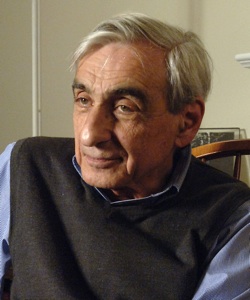Ending Wars Well: Just War Theory and Conflict's End
Ending Wars Well: Just War Theory and Conflict's End Video Player
Thursday, April 22, 2010
9:00 a.m. - 2:00 p.m. EDT
Location:
Copley Hall Copley Formal Lounge Map
How can war end well? President Obama's Nobel Prize speech argued, "There will be times when nations...will find the use of force not only necessary but morally justified." But what comes next? Just War theory, which the President referenced, traditionally focused on the morality of the decision to go to war (jus ad bellum) and the ethics of how war was fought (jus in bello) not the nature of war's end and post-conflict. However, protracted conflicts like that in Afghanistan challenge both the president's foreign policy as well as the theoretical and prescriptive foundations of just war thinking. This Berkley Center conference examined critical questions for a twenty-first century application of Just War theory to war's end (jus post bellum) in three key areas: the theoretical underpinnings of jus post bellum, issues for settlements and post-conflict arrangements, and operational considerations for practitioners engaged in late- and post-conflict planning.
8:30am-9:00am: Light breakfast and coffee
9:00am-10:15am: Jus Post Bellum: Theoretical Considerations
"Just Peace: An Elusive Ideal"
Mark Evans, Swansea University
"A More Perfect Peace: Jus Post Bellum and the Ultimate Object of War"
Robert E. Williams, Jr., Pepperdine University
"Jus Ante and Post Bellum: Completing the Circle, Breaking the Cycle"
George R. Lucas, Jr., U.S. Naval Academy
Moderator: Lise Morje Howard, Georgetown University
10:15am-10:30am: Break
10:30am-12:00pm: Ending Wars Well: Getting To, and Beyond, Settlement
"A Good End and a Good Close"
John Langan, S.J., Kennedy Institute of Ethics, Georgetown University
"Moral Responsibility after Conflict: The Idea of Jus Post Bellum for the Twenty-First Century"
James Turner Johnson, Rutgers University
"In My End is My Beginning"
Robert Royal, Faith and Reason Institute
Moderator: Jean Bethke Elshtain, University of Chicago Divinity School and Leavey Chair in the Foundations of American Democracy, Georgetown University
12:00pm-12:30pm: Lunch
12:30pm-2:00pm: Operationalizing Jus Post Bellum: Issues for Practitioners
"Jus Post Bellum and Civil War: Experiences from the Americas"
David A. Crocker, University of Maryland
"The Just War Tradition and Protracted Conflicts"
Albert Pierce, National Defense University
"Justice After War: Toward a New Geneva Convention"
Brian Orend, University of Waterloo
"Jus Post Bellum and an Ethic of Responsibility"
Jean Bethke Elshtain, University of Chicago Divinity School and Leavey Chair in the Foundations of American Democracy, Georgetown University
Moderator: Rob van Der Waag, Georgetown University
Eric Patterson, Ph.D. is the faculty leader of this event. He is Assistant Director of the Berkley Center for Religion, Peace, and World Affairs and has a visiting appointment in the Department of Government at Georgetown University. His framework for jus post bellum, elucidated in his book Just War Thinking: Morality and Pragmatism in the Struggle Against Contemporary Threats (2007) and separately as a chapter in Brough, et al Rethinking the Just War Tradition (2007), focuses on establishing order, seeking justice, and—in some cases—working towards conciliation. Patterson is the author or editor of six books and numerous articles, most recently the co-edited volume Debating the War of Ideas (2009). Prior to coming to Georgetown University, Patterson spent three years working for the federal government as a White House Fellow and, before that, as William C. Foster Fellow in the State Department's Bureau of Political and Military Affairs.
Discover similar content through these related topics and regions.
Image Gallery
Image Gallery
/1

Ending Wars Well: Just War Theory and Conflict's End

